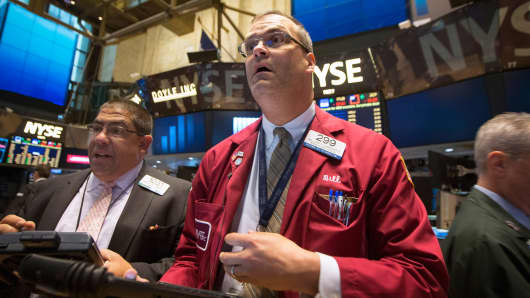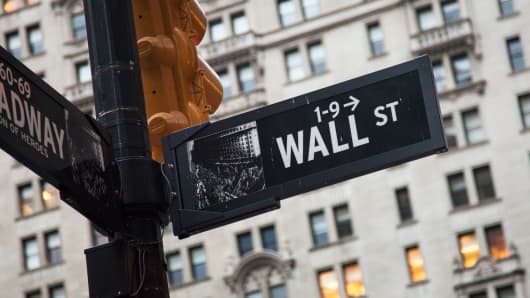US Markets
Market Movers Dow 30 NASDAQ 100 Sectors
U.S. stocks closed down on Friday, breaking five weeks of
consecutive gains as investors awaited the Federal Reserve's
announcement next Wednesday.
The Dow Jones Industrial Average and S&P 500 closed near 3-week lows, as energy led S&P declines for the week and the Dow recovered slightly from an earlier 110-point drop on Exxon losses.
In addition to the impact of upcoming central bank news, most analysts said stocks were reacting to being overbought in the last few weeks.
"This is a market that's basing," Michael Gibbs, co-head of the equity advisory group at Raymond James, said.
JJ Kinahan, chief strategist at TD Ameritrade, attributed the drop to "repositioning" and pointed out, as a "good sign for the market," that financials had held out pretty well during the day. Goldman Sachs and JPMorgan Chase were two of just a few blue-chip advancers, while financials declined the least among the S&P's 10 sectors.
"Part of it is rates rising, although maybe in the short term [it] might hurt those involved with mortgages," he said. The rise lets "banks have a spread in borrowing, which they really haven't had in a while."
Read MoreThis reg change would be huge for small banks
Loren Mark Coffelt, co-portfolio manager of the Empiric 2500 Fund, was also bullish on financials.
"They haven't played into a lot of the economic growth," he said, noting strength in information technology stocks.
Next week, the Federal Reserve will meet and is expected to announce details on quantitative easing and possibly interest rates.
"I think the markets are going to be watching [the Fed] very closely," Randy Frederick, managing director of trading and derivatives at Charles Schwab, said. "The most likely catalyst will be if the Fed changes that language next week, and I think they will."
Read MoreWall street changing rates view
Much speculation has surrounded the timing of Fed action on the interest rate, keeping markets lower despite positive retail sales and consumer sentiment reported on Friday.
"The next FOMC meeting they're going to change the language because the economy is self-sustaining—why do you need interest rates at 0 percent? You've got a GDP rate of 4 percent [and] strong corporate earnings," Douglas Cote, chief market strategist for Voya Investment Management, said. "Strong economic growth is ultimately good for the markets, but in the short term, rising rates are sending the market lower."
The yield on the 10-year Treasury note jumped to 2.61 percent on Friday after beginning the week at 2.42 percent. "I think rates are going up because yields went down on a fear factor because of geopolitical problems," Peter Cardillo, chief market economist at Rockwell Global Capital, said. "Now most of those [fears] have weakened."
Read MoreThis could be the trade of the decade
Businesses inventories rose in July, while the consumer sentiment index reported preliminary September numbers above estimates and the highest in more than a year.
Energy commodities continued to trade at lows."Oil is a fear asset, gold is a fear asset, and they're all coming down. The market is looking past the geopolitical risk," Cote said. "Investors should take this as an opportunity to add to fear assets."
Earlier, low energy prices had boosted transports slightly, with airlines leading gains.
"I prefer to look at places where the energy drop is positive and clearly it's the airlines, and I think also auto sales, which is encouraging for other sales," Marc Chaikin of Chaikin Analytics said.
The European Union implemented a new round of sanctions against Russia on Friday, as did the United States, placing restrictions on firms including Russia's largest bank, several state-owned defense technology companies and five Russian energy companies.
The Dow Jones Industrial Average and S&P 500 closed near 3-week lows, as energy led S&P declines for the week and the Dow recovered slightly from an earlier 110-point drop on Exxon losses.
In addition to the impact of upcoming central bank news, most analysts said stocks were reacting to being overbought in the last few weeks.
"This is a market that's basing," Michael Gibbs, co-head of the equity advisory group at Raymond James, said.
JJ Kinahan, chief strategist at TD Ameritrade, attributed the drop to "repositioning" and pointed out, as a "good sign for the market," that financials had held out pretty well during the day. Goldman Sachs and JPMorgan Chase were two of just a few blue-chip advancers, while financials declined the least among the S&P's 10 sectors.
"Part of it is rates rising, although maybe in the short term [it] might hurt those involved with mortgages," he said. The rise lets "banks have a spread in borrowing, which they really haven't had in a while."
Read MoreThis reg change would be huge for small banks
Loren Mark Coffelt, co-portfolio manager of the Empiric 2500 Fund, was also bullish on financials.
"They haven't played into a lot of the economic growth," he said, noting strength in information technology stocks.
Next week, the Federal Reserve will meet and is expected to announce details on quantitative easing and possibly interest rates.
"I think the markets are going to be watching [the Fed] very closely," Randy Frederick, managing director of trading and derivatives at Charles Schwab, said. "The most likely catalyst will be if the Fed changes that language next week, and I think they will."
Read MoreWall street changing rates view
Much speculation has surrounded the timing of Fed action on the interest rate, keeping markets lower despite positive retail sales and consumer sentiment reported on Friday.
"The next FOMC meeting they're going to change the language because the economy is self-sustaining—why do you need interest rates at 0 percent? You've got a GDP rate of 4 percent [and] strong corporate earnings," Douglas Cote, chief market strategist for Voya Investment Management, said. "Strong economic growth is ultimately good for the markets, but in the short term, rising rates are sending the market lower."
The yield on the 10-year Treasury note jumped to 2.61 percent on Friday after beginning the week at 2.42 percent. "I think rates are going up because yields went down on a fear factor because of geopolitical problems," Peter Cardillo, chief market economist at Rockwell Global Capital, said. "Now most of those [fears] have weakened."
Read MoreThis could be the trade of the decade
Businesses inventories rose in July, while the consumer sentiment index reported preliminary September numbers above estimates and the highest in more than a year.
Energy commodities continued to trade at lows."Oil is a fear asset, gold is a fear asset, and they're all coming down. The market is looking past the geopolitical risk," Cote said. "Investors should take this as an opportunity to add to fear assets."
Earlier, low energy prices had boosted transports slightly, with airlines leading gains.
"I prefer to look at places where the energy drop is positive and clearly it's the airlines, and I think also auto sales, which is encouraging for other sales," Marc Chaikin of Chaikin Analytics said.
The European Union implemented a new round of sanctions against Russia on Friday, as did the United States, placing restrictions on firms including Russia's largest bank, several state-owned defense technology companies and five Russian energy companies.
Wall Street had looked set to open narrowly lower on Friday on this week's key U.S release—retail sales, which rose in-line with expectations in August at 0.6 percent.
"I think consumer confidence and low energy prices are being reflected in retail sales," Art Hogan, chief market strategist at Wunderlich Securities, said.
Some rebound had been expected in August sales after July's subdued reading of a 0.3 percent gain, with underlying spending supported by the marked decline in gasoline prices.
Read MoreEveryone loves Alibaba, demand soaring: Sources
"Bottom line, retail sales remain good but not great," Peter Boockvar, chief market analyst at The Lindsey Group, said in a note.
Separately, the Labor Department reported the biggest drop in nine months for U.S. import prices, which fell in August, matching expectations.
"I think consumer confidence and low energy prices are being reflected in retail sales," Art Hogan, chief market strategist at Wunderlich Securities, said.
Some rebound had been expected in August sales after July's subdued reading of a 0.3 percent gain, with underlying spending supported by the marked decline in gasoline prices.
Read MoreEveryone loves Alibaba, demand soaring: Sources
"Bottom line, retail sales remain good but not great," Peter Boockvar, chief market analyst at The Lindsey Group, said in a note.
Separately, the Labor Department reported the biggest drop in nine months for U.S. import prices, which fell in August, matching expectations.
The Dow Jones Industrial Average closed down 61.4 points, or 0.36 percent, at 16,987.51.
The S&P 500 was down 11.9 points, or 0.60 percent, at 1,985.54, with energy and utilities the hardest hit as all 10 sectors closed in the red.
The Nasdaq closed 24.2 points lower, or 0.53 percent, at 4,567.60.
The CBOE Volatility Index (VIX), widely considered the best gauge of fear in the market, traded near 13.5.
For every advancer, four declined on the New York Stock Exchange in the close, with an exchange volume of 672 million, and composite volume of 3.1 billion.
Crude oil futures closed down 56 cents at $92.27 a barrel on the New York Mercantile Exchange, while gold closed down $7.50 to $1,231 an ounce.
Read MoreApple reports record pre-orders for iPhone 6
In the corporate space, Darden Restaurants reported fiscal first-quarter profit of 32 cents per share, one cent above estimates, with revenue also above forecasts. The company said it is pleased with improvements seen recently but that it still has more work to do. Separately, Darden is under more pressure from activist investor Starboard Value, which submitted 300 slides detailing ways to improve the Olive Garden parent's operations.
Yahoo hit an eight-and-a-half year high on news that Alibaba, which the U.S. firm has a 22.5 percent stake in, will close the books on its IPO because of strong demand.
eBay came off its highs after Reuters quoted a company spokesman saying the online auction website had no conversations with Google about acquiring a stake in the company.
Sprint
moved higher after Cowen upgraded the mobile carrier's stock to
"outperform" from "market perform," citing new management and network
changes that make the company a long-term investment opportunity.
T-Mobile gained ground after CEO John Legere told investors at a New York Conference the company added 552,000 post-paid customers in August, more than any other month in its history.
Read MoreAmid Alibaba fever, reasons for caution with IPOs
Vail Resorts continued to rise, on news that Credit Suisse is raising its price target to $97 from $87, a day after Vail said it would acquire Utah's Park City Mountain Resort for $182.5 million.
XPO Logistics surged on news the air delivery and freight services company secured a $700 million investment from the Ontario Teachers' Pension Plan, PSP Investments and Singapore's Sovereign Wealth Fund GIC. The sale gives the three funds a 21 percent stake in the company.
Read MoreConfessions of a Wall Street trader
Valeant Pharmaceuticals gained ground after Pershing Capital's Bill Ackman said investors owning more than 35 percent of Allergan have asked that company to hold a special meeting. Ackman is trying to broker a sale of Allergan to Valeant.
—By CNBC's Evelyn Cheng. CNBC's Rich Fisherman contributed to this report.
T-Mobile gained ground after CEO John Legere told investors at a New York Conference the company added 552,000 post-paid customers in August, more than any other month in its history.
Read MoreAmid Alibaba fever, reasons for caution with IPOs
Vail Resorts continued to rise, on news that Credit Suisse is raising its price target to $97 from $87, a day after Vail said it would acquire Utah's Park City Mountain Resort for $182.5 million.
XPO Logistics surged on news the air delivery and freight services company secured a $700 million investment from the Ontario Teachers' Pension Plan, PSP Investments and Singapore's Sovereign Wealth Fund GIC. The sale gives the three funds a 21 percent stake in the company.
Read MoreConfessions of a Wall Street trader
Valeant Pharmaceuticals gained ground after Pershing Capital's Bill Ackman said investors owning more than 35 percent of Allergan have asked that company to hold a special meeting. Ackman is trying to broker a sale of Allergan to Valeant.
—By CNBC's Evelyn Cheng. CNBC's Rich Fisherman contributed to this report.
















0 σχόλια:
Δημοσίευση σχολίου
Ο σχολιασμός επιτρέπεται μόνο σε εγγεγραμμένους χρήστες